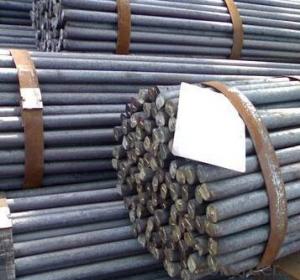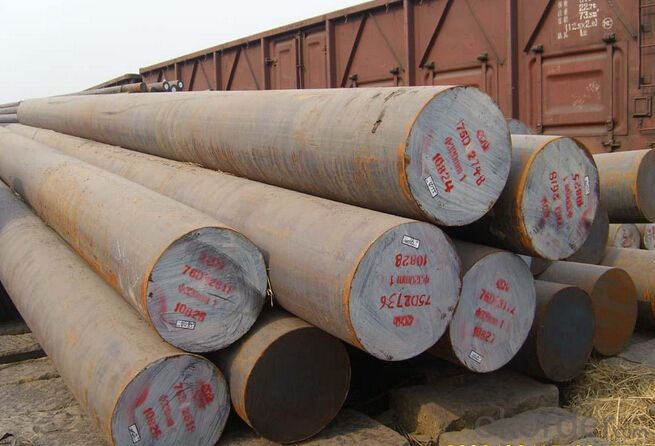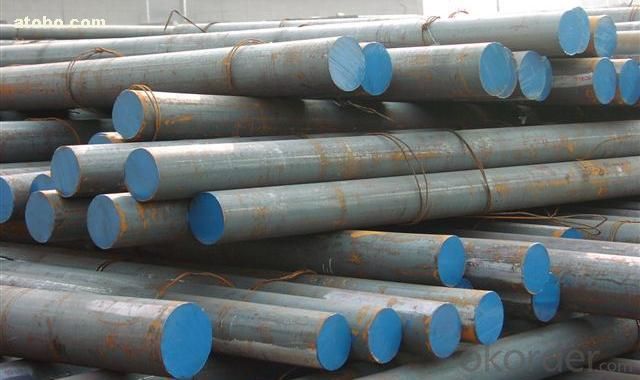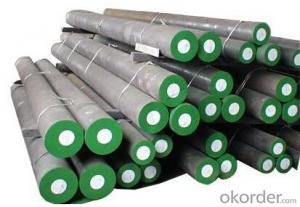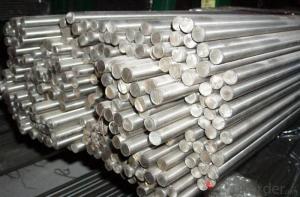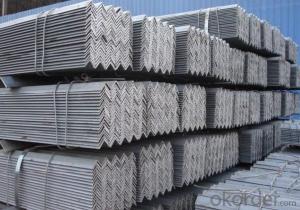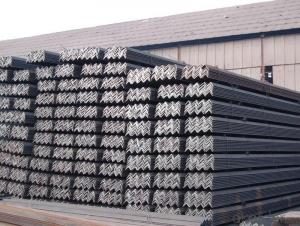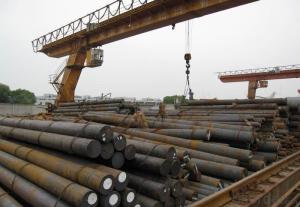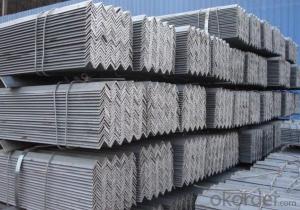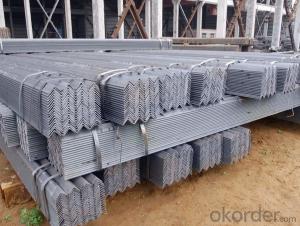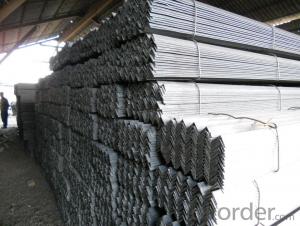ASTM A36 Steel Equivalent Q235 Carbon Steel
- Loading Port:
- China main port
- Payment Terms:
- TT or LC
- Min Order Qty:
- 30 m.t.
- Supply Capability:
- 10000 m.t./month
OKorder Service Pledge
OKorder Financial Service
You Might Also Like
Specification
ASTM A36 Steel Equivalent Q235 Carbon Steel
Product Information:
1.DIA:10mm-300mm
Length:4-12M
Quality:L.F+V.D etc
2. Chemical Elements
| Grade | C | Si | Mn | P | S | Cr | Ni | B |
| 1020 | 0.17-0.23 | 0.17-0.37 | 0.35-0.65 | Max 0.030 | Max 0.030 | Max 0.25 | Max 0.30 | 0.0008-0.0030 |
| 1045 | 0.42-0.50 | 0.17-0.37 | 0.50-0.80 | Max 0.030 | Max 0.030 | Max 0.25 | Max 0.30 | 0.0008-0.0030 |
3. Grade: ASTM A36 Q235
Hardness:156HB
Tensile strength:410MPA
Yield strength: 245MPA
elogation:25% Reduction of area:55% AKV(impact value):54J
Product Overviews:
| Product Name | Typical Grades | Diameter(mm) | Standard adopted |
| Carbon Steel | 20 (1020/S20C/C22) | Ø16-Ø300 | GB/SAE/JIS/DIN |
| 40 (1040/S40C/C40) | |||
| 45 (1045/S45C/C45) | |||
| Bearing Steel | GCr9 (51100/SUJ1) | Ø12-Ø250 | |
| GCr15 (52100/SUJ2/100Gr6) | |||
| GCr9SiMn (A485-Gr.1/SUJ3) | |||
| Cr-Mo Steel | 20Cr (5120/SCr420H/20Cr4) | Ø12-Ø250 | |
| 40Cr (5140/SCr440/41Cr4) | |||
| 42CrMo(4140/SCM440/42CrMo4) | |||
| Gear Steel | 20CrNiMo | Ø16-Ø600 | |
| 20CrMn(5115/SMnC420/20MnCr5) | |||
| 20CrNiMo(8620/SNCM220/20CrMiMo2) |
Product Show:

Our Advantages:
· Industry experience over 20 years.
· Shipment of goods -More than 70 countries worldwide.
· The most convenient transport and prompt delivery.
· Competitive price with best service.
· High technical production line with top quality products.
· High reputation based on best quality products.
With our experienced, enthusiastic and dynamic staffs, we assure to bring you the products with best quality, reasonable prices and good after-sales services under the motto: Friends First, Business After.
Communication, Experience, Expertise and Best efforts are our Promises to you.
Special steel and there is no uniform definition of the concept of special steel is generally considered to have a special chemical composition (alloying), using a special production process, with a special organization and performance to meet the special needs of the steel type. Compared with ordinary steel, special steel has a higher strength and toughness, physical properties, chemical properties, biocompatibility and process performance.
China and Japan, the EU definition of special steel closer, into the special steel quality carbon steel, alloy steel, high alloy steel (alloying elements greater than 10%) three categories, including steel and high-alloy special steel production accounted for 70%. The main advantages of special steel carbon structural steel, carbon tool steel, carbon spring steel, alloy spring steel, alloy steel, ball bearing steel, alloy tool steel, high alloy tool steel, high speed tool steel, stainless steel, heat-resistant steel , and high-temperature alloys, precision alloy, electric alloy. There are nearly 2,000 special steel grades, about 50,000 varieties and specifications in the world currently. In addition to a wide range of special steel outside, in the specification with ordinary steel also showed different characteristics. In addition to plates, tubes, wire, strip, rods and profiles outside, as well as composite materials, surface alloying material, surface treatment material, forging materials, precision casting, powder metallurgy products.
- Q: What are the disadvantages of using special steel?
- One of the main disadvantages of using special steel is its high cost. Special steel is typically more expensive to produce and purchase compared to regular steel. Additionally, the production process for special steel often requires specific techniques and equipment, which can further increase costs. Another disadvantage is the limited availability of special steel. It may not be readily accessible in all regions, leading to longer lead times and potential supply chain issues. Moreover, special steel may have lower formability and machinability compared to regular steel, making it more challenging to work with and shape as needed.
- Q: What are the main advantages of using special steel in the medical field?
- The main advantages of using special steel in the medical field are its high strength and durability, corrosion resistance, and compatibility with sterilization processes. Special steel can withstand harsh conditions and repetitive use without compromising its integrity, making it ideal for medical devices and surgical instruments. Additionally, its resistance to corrosion ensures a longer lifespan and reduces the risk of contamination. The compatibility with sterilization methods, such as autoclaving, ensures that medical equipment remains safe and sterile for patient use.
- Q: What are the factors affecting the cost of special steel?
- There are several factors that can affect the cost of special steel. Firstly, the cost of raw materials used in the production of special steel, such as iron ore and alloys, can have a significant impact on its overall price. Additionally, the level of demand for special steel, both domestically and globally, can influence its cost. Factors such as market competition, economic conditions, and government policies can also play a role in determining the price of special steel. Lastly, the complexity of the manufacturing process, including the level of skill required and the use of advanced technologies, can contribute to the higher cost of special steel compared to regular steel.
- Q: What are the environmental impacts of using special steel?
- The environmental impacts of using special steel can vary depending on factors such as the production process, sourcing of raw materials, and waste management practices. However, some common environmental impacts associated with special steel production include carbon dioxide emissions, energy consumption, water pollution, and habitat destruction. Special steel often requires high energy inputs and releases significant amounts of greenhouse gases during production, contributing to climate change. Additionally, the extraction and processing of raw materials used in special steel production can lead to water pollution and habitat degradation if not managed properly. It is important for industries to adopt sustainable practices and technologies to minimize these environmental impacts and promote a more sustainable use of special steel.
- Q: What are the different galvanizing techniques used for special steel?
- There are several galvanizing techniques commonly used for special steel, including hot-dip galvanizing, electro-galvanizing, and mechanical galvanizing. Each technique has its own advantages and is suitable for specific applications.
- Q: How long does special steel last compared to regular steel?
- Special steel generally lasts longer than regular steel due to its superior properties and enhanced durability.
- Q: Can special steel be used in the plastic manufacturing industry?
- Yes, special steel can be used in the plastic manufacturing industry. Special steel is often used for making molds and dies, which are critical components in the plastic manufacturing process. These molds and dies need to be strong, durable, and able to withstand high temperatures and pressures. Special steel, such as tool steel or stainless steel, can provide the necessary properties to ensure the quality and longevity of plastic manufacturing equipment.
- Q: How does special steel contribute to reducing product downtime due to repairs?
- Special steel contributes to reducing product downtime due to repairs by providing enhanced durability and resistance to wear and tear. Its unique composition and properties enable it to withstand harsh conditions, such as high temperatures, corrosion, and mechanical stress. This reduces the frequency of repairs and maintenance required for products, resulting in less downtime. Additionally, special steel's high strength and toughness allow for the design of more reliable components, ensuring longer operational life and minimizing the need for frequent repairs.
- Q: What are the different methods of analyzing the microstructure of special steel?
- There are several methods available for analyzing the microstructure of special steel. These methods involve the examination and characterization of the steel at a microscopic level to understand its composition, grain structure, and other features. Some of the commonly used methods include: 1. Optical Microscopy: This method involves the use of light microscopy to observe the microstructure of special steel. It allows for the identification of different phases, grain boundaries, inclusions, and other features. Optical microscopy provides valuable information about the size, distribution, and morphology of different constituents in the steel. 2. Scanning Electron Microscopy (SEM): SEM is a powerful technique that uses a high-energy electron beam to analyze the microstructure of special steel. It provides detailed information about the surface topography, morphology, and elemental composition of the steel. SEM is particularly useful for studying the presence of precipitates, segregation, and other microstructural defects. 3. Transmission Electron Microscopy (TEM): TEM is an advanced technique that allows for the analysis of the microstructure at a much higher resolution compared to optical and SEM methods. It involves the transmission of electrons through a thin sample, which provides information about the crystal structure, dislocations, and other fine details of the microstructure. TEM is especially useful for studying the nanostructures and interfaces in special steel. 4. X-ray Diffraction (XRD): XRD is a non-destructive method that uses X-rays to analyze the crystal structure and phase identification of special steel. It provides information about the crystallographic orientation, grain size, and phase composition of the steel. XRD is widely used for analyzing the phase transformations and residual stress in special steel. 5. Electron Backscatter Diffraction (EBSD): EBSD is a technique that combines SEM with crystallographic analysis. It provides information about the crystal orientation, texture, and grain boundaries in special steel. EBSD is useful for studying the deformation mechanisms, recrystallization, and grain growth in the steel. 6. Energy Dispersive X-ray Spectroscopy (EDS): EDS is a technique that is often used in conjunction with SEM or TEM to analyze the elemental composition of special steel. It provides information about the presence and distribution of different chemical elements in the microstructure, allowing for the identification of phases and the characterization of inclusions. These methods, along with others, provide valuable insights into the microstructure of special steel, enabling researchers and engineers to understand its properties, performance, and potential applications.
- Q: What are the challenges in surface treating special steel?
- Some of the challenges in surface treating special steel include achieving uniform and consistent coatings, ensuring adhesion of the coating to the steel substrate, overcoming the high hardness of the steel, preventing distortion or warping during the treatment process, and managing the potential for thermal degradation or oxidation. Additionally, the presence of unique alloying elements in special steel may require specialized treatment techniques to achieve the desired surface properties.
Send your message to us
ASTM A36 Steel Equivalent Q235 Carbon Steel
- Loading Port:
- China main port
- Payment Terms:
- TT or LC
- Min Order Qty:
- 30 m.t.
- Supply Capability:
- 10000 m.t./month
OKorder Service Pledge
OKorder Financial Service
Similar products
Hot products
Hot Searches
Related keywords
